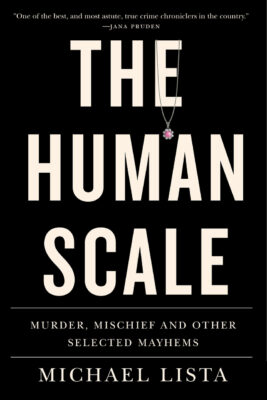Two things can be true. That we’re living in a golden age of true crime content, with serial killer docs and investigative podcasts regularly topping the charts in Canada. And that we’re witnessing the erosion of traditional journalism careers, with outlets cutting staff and budgets so predictably, there’s little risk of this claim being out of date by the time this review goes to print.
In this way, Michael Lista’s The Human Scale highlights two types of tragedy: the obvious, visceral kind found in the crimes he documents – computer hacking, hazing, medical abuse, murder – and the risks to the actual long-form journalism that provides fodder for #CrimeTok and citizen detectives.
The Human Scale Véhicule Press
Murder, Mischief, and Other Selected Mayhems
Michael Lista
$22.95
paper
240pp
9781550656206
This crucial follow-up segment sheds light on the sheer amount of time and effort that is expended by Lista before a single word is written, building trust, decoding court documents, doing interviews for background. However, Lista is able to do so with access to what are perhaps the greatest luxuries of all for a journalist – long lead times and a healthy legal team.
Also a poet and literary critic, Lista regularly cites Shakespeare, T.S. Eliot, and George Orwell throughout, proclaiming: “I’m not a crime reporter; I’m a writer. To the reporter, all that matters is getting there first. But, to the writer, what matters is abiding there longest.” He goes as far as questioning the usefulness of “true crime” as a genre at all (book deals aside), when his own work covers everything from insurance scams to child abduction.
The collection opens with “Grifter,” an outrageous, occasionally amusing look at prolific Toronto con artist and serial squatter James Regan. His subject engages in the sort of blowhard behaviour that’s as unimaginable as murder, if you’re the type to lie awake at night wondering if you used too many exclamation marks in an email.
The last piece is its most high-profile case – and the story Lista says has affected him the most deeply – the murder of Elana Fric by her husband Mohammed Shamji, both lauded Canadian doctors. As Lista readily notes, “Love Story” drew criticism for its misogynist or racist framing, depending on who you ask. In both the chapter’s postscript and the book’s introduction, he grapples with the push to avoid glorifying criminals by decentring them.
“We write villains as main characters for a reason: they’re the ones who make the consequential decisions. Shamji was the real plot machine in ‘Love Story.’ It was his choices that changed, and ended, Elana’s world. But, in deciding not to centralize him and instead make Elana the protagonist, was I suggesting she was responsible for her own murder?”
Amid its attention to detail – a mischievous smile, an ill-fitting suit – The Human Scale may be at its most effective when it highlights the broken systems that both victims and journalists are up against: law, order, academia, medicine. Readers who might not normally seek out tales of systemic injustice will encounter them in these pages, and find themselves questioning the cruel landscape of Canada’s refugee process, failure of police in the face of domestic violence, or the ethics of forensic pathology.
Lista’s true crime career is about to get a boost – Apple+ is adapting one of his Toronto Life features (though not from this collection) about an undercover operation gone wrong. Hopefully it will retain his unique voice from page to screen, and, if it’s a hit, there’s clearly more where that came from.mRb






0 Comments